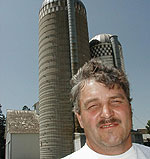By Mark Steil
Minnesota Public Radio
July 8, 2002
Seven individuals and one company have entered guilty pleas in a corruption scandal centered in Pipestone in southwest Minnesota. Many people have been directly affected by the crimes, which stretch back at least 15 years. Even more people are being hurt as the consequences of the crimes continue to ripple through the community.
| |
|
|
|
||
Talk with people in nearly any town and it isn't long before you'll hear them complaining about the "bigshots". They're talking about the business and government leaders who make the important decisions. Most of the time the complaints are pure rumour, but they go like this: the bigshots are running things, they're lining their pockets, they're breaking the law. But in Pipestone rumor became fact; the bigshots were breaking the law. And even better, says Mike Ziebarth, they got caught.
"Those gentlemen ruined a lot of people's lives," says Ziebarth. "And I guess if the common Joe had done it, he'd be in prison. And I guess those gentlemen are probably entitled to the same kind of sentence."
Ziebarth now lives in northern Minnesota, but for most of his life he ran a construction company in Pipestone. The gentlemen he mentions includes community pillars like former city administrator David Logan. Wherever Logan went, crime seemed to follow. The other gentlemen included a banker, a contractor, a veterinarian. They formed a tight criminal gang nicknamed the "Pipestone Mafia." They've admitted participating in everything from bid-rigging to bribes, kickbacks to phony loans. During the 1980s Ziebarth watched Logan control the city bid process. He suspected it was rigged.
"When people that are in the know and in control are the ones that are catering to a specified few, I think that's wrong," says Ziebarth. "And that makes it a lot tougher for everybody else."
| |
|
|
|
||
He says he rarely bid on city contracts because he felt there was no way to compete in an unfair system.
Clark Burmeister is also a contractor in Pipestone. He worked for his dad's construction company during the 1980s when most of the bid-rigging took place. He says the wrong-doing hurt contractors. Not only did they lose profitable contracts, they also lost time and money preparing bids which had no chance of winning. He says the crimes hurt the city's reputation and fears that will keep new businesses from coming to town. He also says it undermined people's faith in government.
"A lot of people that couldn't do anything about it and got fed up with it; just moved out of town," says Burmeister. "Because you can't fight city hall and win; that just doesn't happen."
One of those who tried to fight the corruption was Fargo newspaper copy editor Barry Amundson. Amundson worked for the Pipestone newspaper during most of the 1980s. He says during that time he suspected bid rigging and kickbacks were taking place in city hall.
"It's a great story you know, cause to me it's a perfect example of small town corruption," says Amundson.
He wanted to investigate. He took several specific story ideas to his editor.
"It was just wrong from the very beginning and I could see it all there, I mean I really could just very clearly," says Amundson. "And I wanted to write some of this and the publisher just wouldn't let me; that's just the way it was."
| |
|
|
|
||
He says too often small-town newspapers avoid controversial stories because they worry the coverage will damage the city's reputation. Amundson says he wrote stories which nibbled at the edge of the corruption, but never was turned loose at the center.
He says his experience leaves a great what-if question. What if the newspaper had been aggressive? Could the corruption have been uncovered early on and stopped? Amundson admits it would have been difficult to uncover the heart of the crimes. He points out it tooks an FBI investigation to break the case open, but he wishes he could have tried.
Pipestone newspaper publisher Chuck Draper remembers things differently. Draper says the paper did the best it could on the story. He says he does not recall telling Amundson to back off.
"I guess I had to remind Barry that you can't call people crooks in print without proof," says Draper. "And I guess I honestly don't recall telling him not to pursue this or not to pursue that. And I don't feel that because of me Barry Amundson was unable to expose a crook."
The crook Draper is talking about is former Pipestone city administrator David Logan. While in that job, he rigged the bid process. A convicted construction company owner says he paid Logan money to win city contracts.
| |
|
|
|
||
After leaving city hall, Logan helped start a hog-production company. He's admitted committing several crimes there, including bribery. A Rock County feedlot official admitted giving Logan's hog company preferential treatment in return for money and loans.
Because of the bribery, Minnesota Pollution Control Agency officials have Rock County under a microscope. The MPCA's Myrna Halbach says all livestock farms there will be inspected. She says the agency needs to find out if the convicted county official failed to enforce state feedlot standards on any other Rock County farms.
"He may have let things lapse or he didn't enforce the rules to the standard everybody else was meeting," says Halbach.
Rock County farmers feel picked on. Gene Sandager says cattle and hog producers there have met all state pollution standards in the past and are being penalized for the crimes of others.
"To have this happen, we just can't believe it," says Sandager. "It's like, we complied, why are you kicking us?"
| |
|
|
|
||
Sandager worries the MPCA will saddle Rock County farmers with thousands of dollars in unnecesssary pollution control costs. The MPCA's Halbach predicts most farmers will see very little added expense from the state inspections. She also says since all Minnesota counties will eventually go through a similar inspection process, Rock County farmers may be ahead by getting it over with. And in a final twist, the cost of the inspection will be paid for by the man who helped cause it, David Logan. As part of his guilty plea he agreed to pay $160,000 for the Rock County feedlot canvass. Logan recently issued a public apology saying he was "ashamed" of the way he treated Pipestone citizens. Contractor Clark Burmeister says there's a simple lesson in Logan's disgrace.
"I have morals. I guess I was raised that way," says Burmeister. "I'd rather do it honestly than dishonest. I don't want to end up in prison or anything."
Many people feel Logan and the rest deserve prison time. They say anything less would be an insult to hardworking citizens who follow the rules.
MPR reporters Dan Gunderson, Stephanie Hemphill, Bob Reha and intern Kate Beeman helped with this story.





